

| Test Stands | |
Test stands provide a stable platform to mount a force gauge, load cell or torque sensor. However, intermediate and basic performance test stands do not have built in load sensing capability, and therefore, sensors that are mounted must have an indicator to display force. In some cases, force gauges can provide basic control of the test stand. When it is necessary to measure distance traveled, many test stands have distance measuring options, either as an external device or a factory installed internal encoder. There are three categories of tests stands, basic, intermediate, and high performance. |
|
| High Performance Test Stands
High performance test stands are programmable from a console and are the most capable of the test stand category. This class of stand will have the control and perform most of the tests of a material tester. All of these stands have plug and play load cells as the force sensor, built in distance encoders, support for multi step programs, multi results calculations, can be password secured, and can export results and data points to personal computers for futher analysis and reporting. Some testers are stand alone and others require a computer to operate. None of these testers will support extensometers or LVDTs. This class of test stand are table top and some are available in capacities to 50kN. |
|
Chatillon
|
|
|
Mecmesin
Note: We have special calibration equipment for Mecmesin's MultiTest-i Series load cells and can calibrate to factory specifications.
|
| Intermediate Performance Test Stands
Intermediate motorized test stands have the features of a basic test stand, but also include automatic control features. All stands in this class will run with a push of a button and continue to run to a pre established limit before stopping. The travel can also be stopped with a stop button. These test stands will interact with a gauge mounted to them, usually for force set points, although some have a higher level of control and will stop or reverse the test stand upon sample break or rupture. These test stands will have various operating modes such as run to a limit and stop, run to a limit and reverse direction and stop, and continuous cycle between limits. Intermediate test stands provide good test repeatability and improve productivity by freeing the operator to perform other tasks while the tester is running or returning. This class of stand is limited to 1100 lbf. |
|
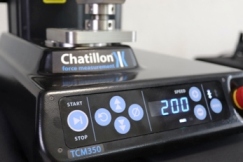 |
Chatillon
|
Chatillon
|
|
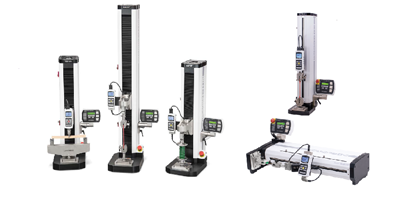 |
Mark-10
|
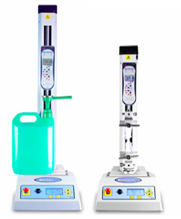 |
Mecmesin
|
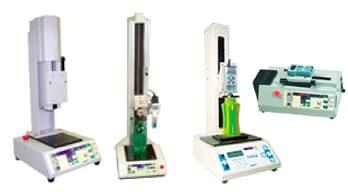 |
Shimpo
|
| Basic Performance Test Stands
Basic test stands fall into two categories: Manual and Motorized. Maximum capacity available is 1100 lbf. Manual test stands are further divided into lever and wheel operated, distance measurement may be available as an option. This class of stands is the least expensive. However, speed of operation is difficult to control and specify in an instruction. Wheel operated test stands provides better speed control since it is not as easy to operate at high speeds, however, can become more difficult to control at higher force levels. Basic motorized test stands have adjustable pull and push speed, usually via a dial. Some have graduations next to the dial indicating set speed while others will have an associated digital display of set speed. Not all basic test stands will have upper or lower travel limits or high speed return. Some will have the ability to interact with set points on a force gauge. Travel distance indication is usually not available, although some may have external indication devices that can be added. All stands in this class will require the operator to hold the run button during the test and return cycle. Motorized test stands offer good test repeatability and make specifying speed of the force measurements easy to document in a test procedure. |
|
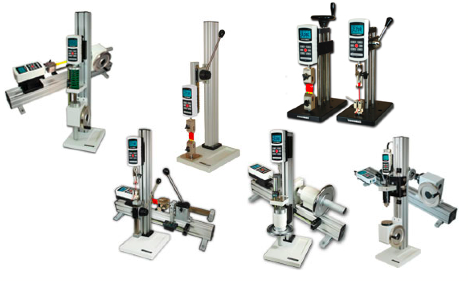 |
Mark-10
|
|
Chatillon
|
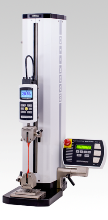 |
Mark-10
|